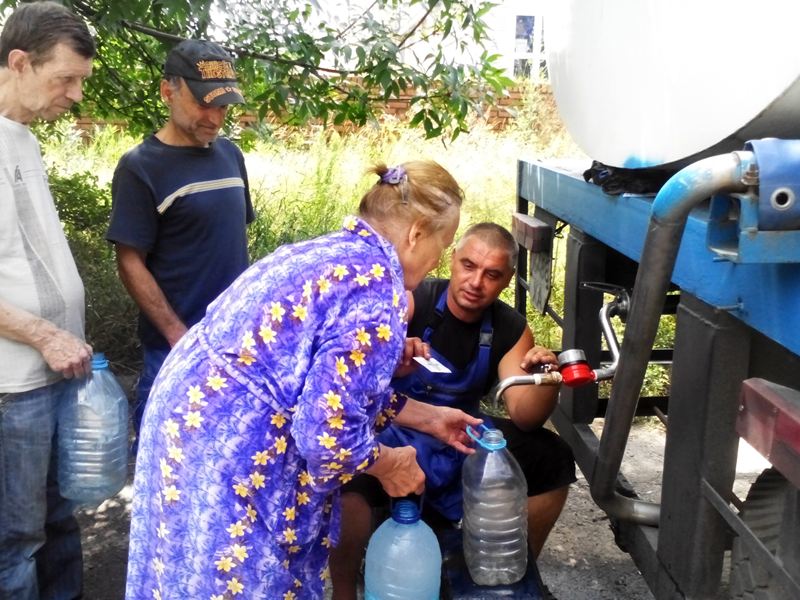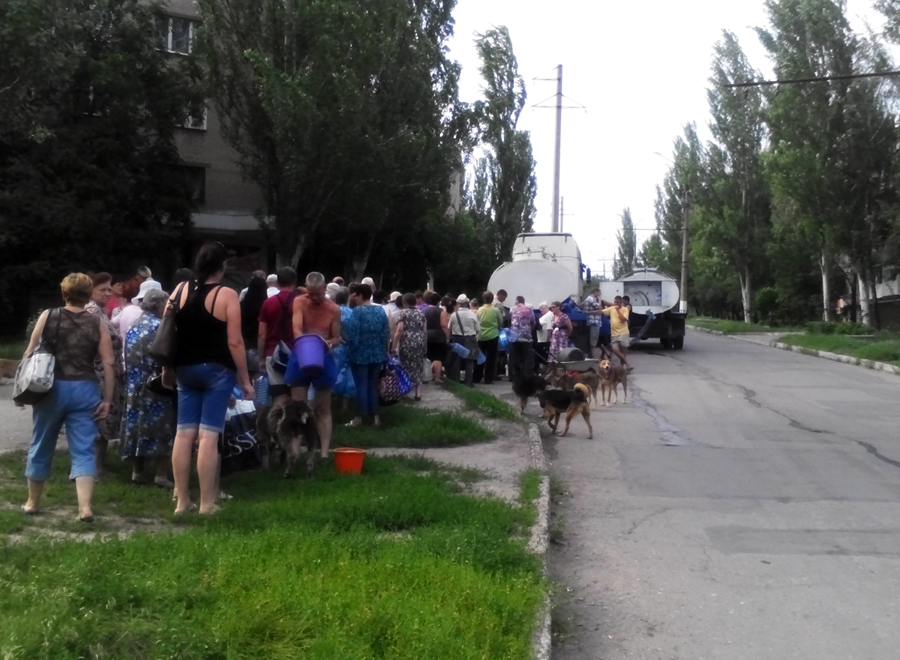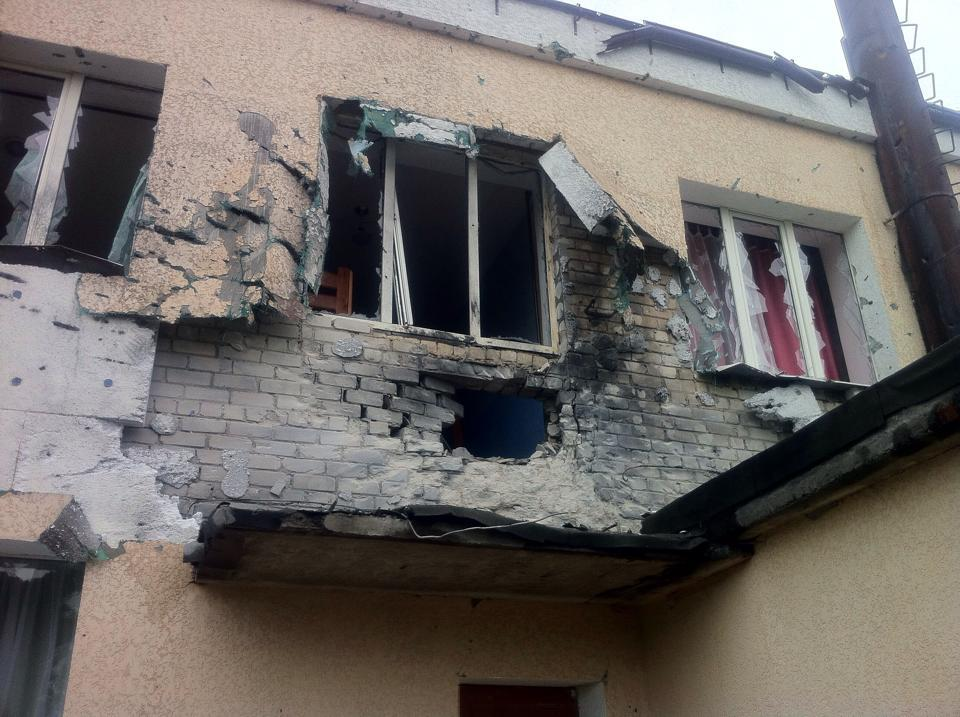
16.07.2014, Ukraine
Since April Caritas Ukraine and its regional organizations have been taking care of forced IDPs from Crimea and east oblasts of the country. It is a part of a large-scale program of assistance to victims of mass protests during EuroMaidan events, families of deceased people, internally displaced persons and victims of military actions in the Eastern Ukraine. Total budget of such work amounts to 10 millions hryvnias and for 95% is formed with help of foreign benefactors.
At the moment in the ATO zone (note: anti-terrorist operation is a complex of measures directed at prevention, avoidance and suppression of terroristic actions) and grueling situation continues to persist in Donetsk, Gorlivka, Luhansk, Antratsyt, Severodonetsk, informs Dmytro Tymchuk, head of Center for military and political study, representative of the “Information Resistance” group.
For the period of military actions in the Eastern Ukraine more than 170 military men and almost 500 peaceful citizens died. According to the UN Refugee Agency over 50 thousand peaceful citizens were forced to leave their place of dwelling and region.
“Such circumstances oblige Caritas Ukraine to use all possible efforts to assist people in east oblasts of Ukraine, the same as those who were forced to move to the Western part of Ukraine for safety reasons,” notes Yuriy Nakonechnyi, Head of the Emergency Unit in Caritas Ukraine. “Care of IDPs, first of all, foresees evaluation of our clients’ needs and keeping of special data base that is a background for rendering specific and individual social services for displaced persons, notably accommodation, securing clothes, shoes and food products, help in legal issues, employment, transport services, rendering of psycho-social follow-up. This activity obliges us to be present in Eastern Ukraine and assist local citizens.”
After the last visit to Slovyansk we interviewed Grygoriy Seleshchuk, coordinator of this program, about humanitarian actions and approach to care of forced displaced persons from Crimea and Eastern Ukraine.
What are your impressions of liberated Slovyansk? What sentiments prevail in this region?
I can compare my two visits (last time I was in Slovyansk in the beginning of July) and for two weeks it seems to become a different town. During my first visit it was really dreadful, dangerous and gray; it seemed to be a ghost town. And now you can see passers-by, bike riders and cars on streets. It is kind of inner shift – people communicate, want to interact, continue living and move ahead.
At the moment electrification, water delivery system and town infrastructure are paralyzed; there is an acute lack of healthcare products. I was greatly impressed by “blind” houses without windows and roofs: people find it psychologically and physically difficult to return back in such flats. Because  of financial, logistic and material problems it will be complicated to sort out these issues in the nearest time.
of financial, logistic and material problems it will be complicated to sort out these issues in the nearest time.
What are humanitarian aspects of your visit to Slovyansk?
Due to absence of electricity, pipeline damage and problems with sewage facilities in Slovyansk and its neighborhood an acute challenge with water arose. That’s why, in few days (note: 10-13 July) together with colleagues we brought and distributed over 53 tones of drinking water.
All in all, we agreed with local authorities that there is need in regular provision of region and we plan to deliver over 75-100 tones of drinking water in the coming days. Caritas Ukraine fills this gap, because others organizations or initiatives don’t act upon the mentioned problem.
Is your work related to care of IDPs?
Yes, in fact, it is continuation of our work. For the first time we came to the zone of conflict in order to contact displaced persons in surrounding localities, because it is the key issue in our project. We wanted to see the place of their location, establish contact with those who assist them. We had an opportunity to visit Slovyansk and we saw that there are far more needs.
Assistance to people who stay there and support of displaced persons are inseparable activities. We can either rearrange assistance at the local level or we have to be ready to provide help to IDPs wherever they are. In my opinion, nobody wants to leave own home, regardless its condition.
In what cities do you implement project of assistance to IDPs and what resources do you have?
There are 6 regional organizations of Caritas Ukraine in Ivano-Frankivsk, Lviv, Kolomyia, Novovolynsk, Drohobych and Sokal that have rendered and are proving help for over 1000 displaced persons. Obviously, they started to help before we got financial support from donors or agreed on concrete concept of assistance – it was nothing more or less than answer of Caritas workers on situation of people who found themselves in crisis and from now live close to them.
In general, our program is tailored for 1200 individuals, but we already have more than 1000 clients and this number will ap parently increase to 1500 persons. This work will last for at least another half a year.
parently increase to 1500 persons. This work will last for at least another half a year.
What are the elements of assistance project?
It is support in accommodation (furnishing, utility bills and rent), nutrition (apart from product packages we actively work on electronic ration cards with ready cash for purchasing products in supermarkets), counseling (on legal issues, overcoming psychological challenges and job hunting) and it is also psycho-emotional help.
At the moment Caritas Ukraine has 4 different programs that are directed at assistance to victims of mass protests during EuroMaidan events, families of deceased people, IDPs and victims of military actions in Eastern Ukraine – it gives us opportunity to solve problems of our clients in an integrated and far-reaching manner.
What is the difference between Caritas Ukraine program of IDPs’ care and other similar initiatives?
Firstly, it is a greater scale, secondly, geography. Thirdly, duration and complexity of assistance.
In our approach we don’t duplicate work that others do. We scrupulously select clients and evaluate their needs. In the first instance, there are pregnant women, large families, families with challenged or disabled persons.
We don’t have special priorities regarding place of IDPs origin. Though 34 of our clients are from Crimea.
Who finances such work? Is there money received from common Ukrainians?
Total budget of our various initiatives and programs on care of IDPs in Western regions amounts to 5 million UAH, over 20% of this sum have been already spent. What is a financial part from Ukraine? Nearly 10-15%.
What are the upcoming plans of Caritas Ukraine in implementation of humanitarian mission in Eastern Ukraine and care of displaced persons?
We analyze needs and take them in consideration when planning our work. Undoubtedly, we will extend geography of our activity: not only Slovyansk, but other cities (Kramatorsk, Kostyantynivka) that were damaged because of military actions.
During the last visit we saw “blind” houses without windows and roofs – we will coordinate with donors possibility to replace such windows and roofs. It is incredibly important for psychological state of person’s health. When you live in a flat without window it seems that you live on street and you have no home. If nobody does something about it, citizens won’t be able to act on this p roblem on their own. It is important to centrally buy glass and construction materials.
roblem on their own. It is important to centrally buy glass and construction materials.
We also think about implementation of the initiative “Replace a window in Slovyansk”, by its means we want to encourage Ukrainians to finance fixing of a concrete window in Slovyansk. Everyone who participates in this initiative will know: I impact fixing of window to the certain address. And a family that will have a window fixed will be aware that Ivan from Lviv or Petro from Cherkassy gave a helping hand in this situation.
Tags:

